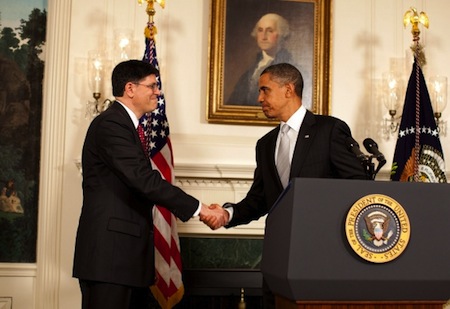
Now that we’ve gotten the excitement about the nomination of U.S. senator John Kerry out of the way, we’re still a long way off from knowing who will succeed Timothy Geithner as U.S. president Barack Obama’s treasury secretary.

Although in terms of protocol, Kerry will undoubtedly remain the top American diplomat, the next U.S. treasury secretary will be just as important — if not more important — than the incoming U.S. secretary of state, and he or she may well have a greater hand in setting foreign policy, given the precarious nature of the U.S. economy.
Although the most recent GDP estimates show that the economy grew at a 3.1% pace in the third quarter of 2012, growth in 2011 was around 1.7%, and any number of global factors could topple even an otherwise impregnable recovery.
Consider all of the key international issues on U.S. president Barack Obama’s agenda over the next four years:
- the ongoing eurozone crisis and the destabilizing blowback to the U.S. economy from a eurozone breakup or further recession, unemployment and depressed aggregate demand in the European Union;
- in the world’s second-largest economy — China — a new leader in Xi Jinping will face a slowing economy and a renminbi currency that remains elevated in value vis-a-vis the U.S. dollar;
- in the world’s third-largest economy — Japan — a new leader in Shinzō Abe will embark upon a massive public spending binge in a country that’s set to become the largest external holder of U.S. debt (supplanting China, which held that role for a decade, and which has seen its own U.S. dollar inflows from export trade slow over the past four years);
- Obama will want to leave office having concluded the Trans-Pacific Partnership, an ambitious trade and cooperation agreement among various North American, South American and Asian countries;
- as the United States transitions from a net energy consumer to a net energy producer in the coming decade or so, foreign policy in the Middle East will become relatively less important as the United States becomes less dependent on Arab oil; and
- for the first time in a generation or more, ‘investment’ and ‘boom,’ rather than ‘AIDS,’ ‘civil war,’ ‘famine’ and ‘genocide’ are more applicable to sub-Saharan Africa, taken as a whole — there remain major problems, but for the first time, the narrative of ‘cheetah’ economies from Nigeria to Ghana to Ethiopia has outpaced the narrative of horrors (like the ongoing violent morass in the Democratic Republic of the Congo).
All of that means Obama’s next treasury secretary — whether current chief of staff Jacob Lew, BlackRock CEO Larry Fink or someone else — will be at the forefront of the Obama administration’s foreign policy in the next four years.
Remember, too, that the chairman of the Federal Reserve, Ben Bernanke, has been more important than anyone else in the United States over the past four years in stabilizing the world economy after the 2008 financial panic, and his continued emphasis on expansionary monetary policy has implications that go far beyond the U.S. economy. His term ends in 2014, and he’s indicated he won’t stay on for a third term; minds have been known to change in Washington, but economic policymakers and investors alike will be keenly interested in the policy background and ideas of Bernanke’s successor — a choice that will likely be shaped with input from Geithner’s successor (and who may even be Geithner himself). Continue reading The next U.S. treasury secretary will be more important to world affairs than John Kerry →
![]()

